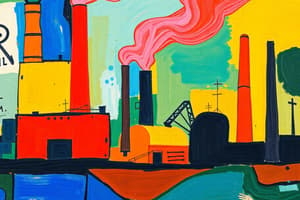Podcast
Questions and Answers
What was the main political significance of the Revolution of 1800?
What was the main political significance of the Revolution of 1800?
- It enabled a peaceful transfer of power between political parties. (correct)
- It marked the end of the Federalist Party.
- It established a Federalist majority in Congress.
- It resulted in the formation of a new political party.
What was the primary outcome of the Marbury versus Madison case?
What was the primary outcome of the Marbury versus Madison case?
- It led to the repeal of the Judiciary Act of 1801.
- It established the importance of presidential appointments.
- It established the principle of judicial review. (correct)
- It increased the powers of state legislatures.
What was a key result of the Embargo Act?
What was a key result of the Embargo Act?
- It successfully prevented British impressment of American sailors.
- It sparked a war with France.
- It significantly damaged the American economy. (correct)
- It strengthened ties with British merchants.
Which event was directly triggered by the attack on the Chesapeake by the British ship Leopard?
Which event was directly triggered by the attack on the Chesapeake by the British ship Leopard?
What was a major consequence of the Louisiana Purchase?
What was a major consequence of the Louisiana Purchase?
What role did Sacagawea play in the Corps of Discovery expedition?
What role did Sacagawea play in the Corps of Discovery expedition?
What was the impact of the Judiciary Act of 1801?
What was the impact of the Judiciary Act of 1801?
What event is recognized as the only successful slave revolt in history?
What event is recognized as the only successful slave revolt in history?
What was the main goal of the embargo imposed by the United States?
What was the main goal of the embargo imposed by the United States?
Which act reestablished trade with most nations but excluded Britain and France?
Which act reestablished trade with most nations but excluded Britain and France?
Why did Madison oppose Macon's Bill 2?
Why did Madison oppose Macon's Bill 2?
Who led an army at the Battle of Tippecanoe?
Who led an army at the Battle of Tippecanoe?
What was one effect of the War of 1812?
What was one effect of the War of 1812?
What nickname was given to the new, more aggressive members of Congress during the 12th Congress?
What nickname was given to the new, more aggressive members of Congress during the 12th Congress?
What significant event occurred following the War of 1812 that bolstered Andrew Jackson's fame?
What significant event occurred following the War of 1812 that bolstered Andrew Jackson's fame?
Which event is characterized by New England Federalists meeting to discuss their grievances during the War of 1812?
Which event is characterized by New England Federalists meeting to discuss their grievances during the War of 1812?
Flashcards
Revolution of 1800
Revolution of 1800
Peaceful transfer of power from Federalists to Democratic-Republicans, marking a shift towards an agricultural society and states' rights.
Judiciary Act of 1801
Judiciary Act of 1801
A law allowing Federalist President Adams to appoint many Federalist judges before leaving office.
Midnight Judges
Midnight Judges
Federalist judges appointed by Adams in the final hours of his presidency.
Marbury v. Madison
Marbury v. Madison
Signup and view all the flashcards
Judicial Review
Judicial Review
Signup and view all the flashcards
Louisiana Purchase
Louisiana Purchase
Signup and view all the flashcards
Corps of Discovery
Corps of Discovery
Signup and view all the flashcards
Sacagawea
Sacagawea
Signup and view all the flashcards
Impressment
Impressment
Signup and view all the flashcards
Embargo Act
Embargo Act
Signup and view all the flashcards
12th Amendment
12th Amendment
Signup and view all the flashcards
Non-Intercourse Act
Non-Intercourse Act
Signup and view all the flashcards
Macon's Bill No. 2
Macon's Bill No. 2
Signup and view all the flashcards
War Hawks
War Hawks
Signup and view all the flashcards
Battle of Tippecanoe
Battle of Tippecanoe
Signup and view all the flashcards
Sally Hemings
Sally Hemings
Signup and view all the flashcards
Aaron Burr
Aaron Burr
Signup and view all the flashcards
War of 1812 Causes
War of 1812 Causes
Signup and view all the flashcards
War of 1812 Effects
War of 1812 Effects
Signup and view all the flashcards
Treaty of Ghent
Treaty of Ghent
Signup and view all the flashcards
Battle of New Orleans
Battle of New Orleans
Signup and view all the flashcards
Andrew Jackson
Andrew Jackson
Signup and view all the flashcards
Hartford Convention
Hartford Convention
Signup and view all the flashcards
Study Notes
Chapter 11: Revolution of 1800 and Beyond
-
Revolution of 1800: Peaceful transfer of power from Adams (Federalist) to Jefferson (Democratic-Republican). Shift towards agricultural society and states' rights. Established a separate ballot for vice presidents (12th Amendment) due to an election tie.
-
Judiciary Act of 1801 and Midnight Judges: The outgoing Federalist Congress created positions for federal judges (Midnight Judges) in Adam's final days to influence the judiciary. Jefferson's Democratic-Republican Congress repealed this act.
-
Marbury v. Madison: William Marbury, a Midnight Judge, was denied his commission by Jefferson's Secretary of State, James Madison. Chief Justice John Marshall ruled in favor of Marbury, establishing the principle of judicial review – the Supreme Court's authority to determine the constitutionality of laws. This greatly increased the judicial branch's power.
-
Haitian Revolution: The only successful slave revolt in history. This impacted Napoleon's plans for reestablishing French Empire as he was unable to reconquer Haiti.
-
Louisiana Purchase: Napoleon sold Louisiana Territory to the US (15 million). This doubled the size of the U.S. but was viewed by Jefferson as a stretch of his constitutional powers. Had the land been held by France, recent conflict with Britain could have caused tensions.
-
Corps of Discovery and Sacagawea: Lewis and Clark's expedition (Corps of Discovery) explored the Louisiana Purchase, charting the land and its features. Sacagawea acted as translator and mediator with Native American tribes for peaceful relations, aiding in procuring needed supplies .
-
Impressment: The British Navy would forcibly draft American sailors into the British Navy. This greatly angered Americans.
-
Chesapeake-Leopard Affair: British ship Leopard attacked American ship Chesapeake, killing Americans. Further escalated tensions with Britain.
-
Embargo Act: Congress enacted this act to prevent British interference in U.S. trade and avoid war. It forbade the export of all American goods. The Embargo Act ultimately hurt the U.S. economy.
-
Non-Intercourse Act: Reopened American trade, but excluded Britain and France from trade.
-
Macon's Bill No. 2: If either Britain or France agreed to stop interfering with American trade, the U.S. would impose restrictions on the other. Napoleon quickly accepted, and the U.S. re-imposed restrictions on Britain. This ended U.S neutrality.
-
War Hawks: New members of Congress (12th Congress) who supported war with Britain called "War Hawks" due to their aggressive stance on disputes with Britain.
-
Battle of Tippecanoe: American general William Henry Harrison defeated a Native American coalition led by Tecumseh, paving his way to fame.
-
Sally Hemings: Enslaved woman thought to have had a long-term relationship with President Thomas Jefferson.
-
Aaron Burr: Tied with Jefferson in the 1800 election for VP, ultimately decided by the House of Representatives. Burr later killed Alexander Hamilton in a duel and was tried for treason for his later plots against the US, found not guilty.
Chapter 12: War of 1812
-
War of 1812 Causes & Effects: Causes included War Hawks, impressment, and Madison's desire to restore American confidence. Effects included nationalism, establishing U.S. as a global power, a longer-term self-sufficient economy, and the "American System." Officially ended by the Treaty of Ghent.
-
Battle of New Orleans & Andrew Jackson: Took place after the war formally ended, but still a major victory for America led by Andrew Jackson, catapulting him to national fame.
-
Hartford Convention: New England Federalists unhappy with the War of 1812's impact on trade met secretly in Hartford, Connecticut.
Studying That Suits You
Use AI to generate personalized quizzes and flashcards to suit your learning preferences.




